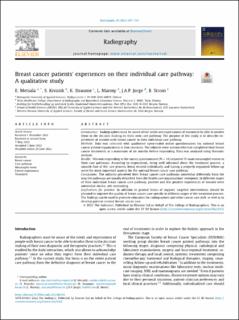| dc.contributor.author | Metsälä, Eija | |
| dc.contributor.author | Kivistik, Siret | |
| dc.contributor.author | Straume, Kjersti | |
| dc.contributor.author | Marmy, Laurent | |
| dc.contributor.author | Jorge, Jose A. Pires | |
| dc.contributor.author | Strøm, Bergliot | |
| dc.date.accessioned | 2023-03-02T11:11:26Z | |
| dc.date.available | 2023-03-02T11:11:26Z | |
| dc.date.created | 2022-09-21T10:06:13Z | |
| dc.date.issued | 2022 | |
| dc.identifier.citation | Radiography. 2022, 28 (3), 697-703. | en_US |
| dc.identifier.issn | 1078-8174 | |
| dc.identifier.uri | https://hdl.handle.net/11250/3055288 | |
| dc.description.abstract | Introduction
Radiographers must be aware of the needs and expectations of women to be able to involve them in the decision making on their own care pathway. The purpose of the study is to describe experiences of women with breast cancer in their individual care pathway.
Methods
Data was collected with qualitative open-ended online questionnaires via national breast cancer patient organizations in four countries. The subjects were women who had completed their breast cancer treatments at a maximum of six months before responding. Data was analysed using thematic analysis.
Results
Women responding to the survey questionnaire (N = 14) reported 11 main meaningful events in their care pathways. According to respondents, being well informed about the treatment process, a smooth flow of the care process, being treated individually and having a properly organized follow-up were the most important aspects for the optimal breast cancer care pathway.
Conclusions
The subjects perceived their breast cancer care pathways somewhat differently from the way the pathways are usually described from the health care organizations’ viewpoint. In different stages of their individual breast cancer care pathway, positive and less positive experiences of women were somewhat similar, yet contrasting.
Implications for practice
In addition to general forms of support, targeted interventions should be planned to improve the quality of breast cancer care specific to different stages of the treatment process. The findings can be used to promote education for radiographers and other cancer care staff, as well as to develop patient-centred breast cancer care. | en_US |
| dc.language.iso | eng | en_US |
| dc.publisher | Elsevier | en_US |
| dc.rights | Navngivelse 4.0 Internasjonal | * |
| dc.rights.uri | http://creativecommons.org/licenses/by/4.0/deed.no | * |
| dc.title | Breast cancer patients’ experiences on their individual care pathway: A qualitative study | en_US |
| dc.type | Peer reviewed | en_US |
| dc.type | Journal article | en_US |
| dc.description.version | publishedVersion | en_US |
| dc.rights.holder | © 2022 The Author(s). | en_US |
| dc.source.pagenumber | 697-703 | en_US |
| dc.source.volume | 28 | en_US |
| dc.source.journal | Radiography | en_US |
| dc.source.issue | 3 | en_US |
| dc.identifier.doi | 10.1016/j.radi.2022.06.002 | |
| dc.identifier.cristin | 2053784 | |
| cristin.ispublished | true | |
| cristin.fulltext | original | |
| cristin.qualitycode | 1 | |

